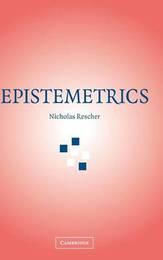
|
Epistemetrics
Hardback
Main Details
Description
When this book was originally published in 2006, Epistemetrics was not as yet a scholarly discipline. With regard to scientific information there was the discipline of scientometrics, represented by a journal of that very name. Science, however, had a monopoly on knowledge. Although it is one of our most important cognitive resources, it is not our only one. While scientometrics is a centerpiece of epistemetrics, it is not the whole of it. Nicholas Rescher's endeavor to quantify knowledge is not only of interest in itself, but is also instructive in bringing into sharper relief the nature of and the explanatory rationale for the limits that unavoidably confront our efforts to advance the frontiers of knowledge. In particular, his book demonstrates the limitations of human knowledge and will be of great value to scholars working in this area.
Author Biography
Nicholas Rescher is University Professor of Philosophy at the University of Pittsburgh, where he is also Co-Chair of the Center for Philosophy of Science. He has received fellowships from the Ford, Guggenheim and National Science Foundations. Author of over one hundred books ranging over many areas of philosophy, he is the recipient of six honorary degrees from universities on three continents and was awarded the Alexander von Humboldt Prize for Humanistic Scholarship in 1984.
Reviews"This book covers a wide span of issues in epistemology and encapsulates complex debates with lucidity. It lives up to its goal of organizing research in contemporary theory of knowledge into a 'single systematic whole.'"
|